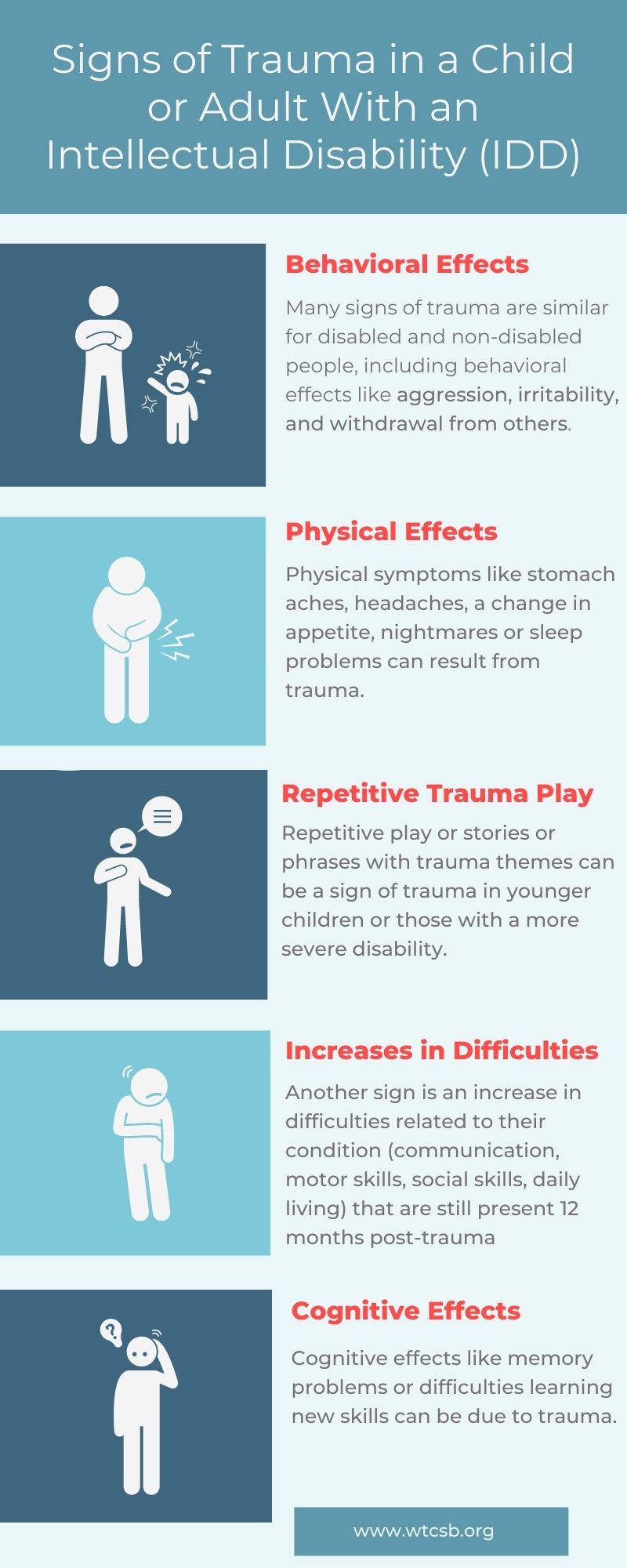It may not be something that many people think about that often but people with intellectual or developmental disabilities can benefit from therapy, too. Just like everyone else, they suffer from depression, anxiety, and other mental health concerns including trauma.
In fact, people with disabilities, particularly intellectual or developmental disabilities, are more susceptible to trauma and the resultant PTSD.
That’s because they often have certain vulnerabilities that open them up to mistreatment like abuse and bullying.
Or in some cases, they might not be able to understand what happened to them or that they’re experiencing trauma.
Intellectual and Developmental Disabilities and Trauma
According to the Association of University Centers on Disability, people with developmental disabilities suffer 2.5 to 10 times the abuse and neglect of their non-disabled peers.
More than 90% of adults with a developmental disability report that they’ve experienced sexual abuse.
In an institutional setting, the risk of sexual abuse is 2 to 4 times higher than in the community. The more severe the disability, the more likely abuse is to occur.
People with intellectual or developmental disabilities are also often more vulnerable to abuse and neglect because of a higher level of assistance required from caregivers, sometimes for long periods of time. This sometimes includes help with invasive daily living functions.
Also, high levels of stress experienced by caregivers may contribute to abuse or neglect.
Trauma can also come from other things besides mistreatment.
The sudden death of a loved one, an accident, natural disaster, or anything else that might cause trauma in any person might be the basis. However, with intellectual or developmental disabilities, the sufferer might not realize they’re experiencing trauma or know what they can do to feel better.
Intellectual or communication problems might mean they struggle to understand or to report what’s happened to them.
Signs of Trauma
Many signs of trauma are similar for disabled and non-disabled people.
They can include:
- Behavioral effects like aggression
- Irritability
- Withdrawal from others
- Physical effects like stomach aches, headaches
- Changes in appetite
- Nightmares or sleep problems
- Cognitive effects like memory problems or difficulties learning new skills.
In those with a developmental or intellectual disability, effects of trauma could also include increases in difficulties related to their condition (communication, motor skills, social skills, daily living) that are still present 12 months post-trauma and, in younger children or those with a more severe disability, repetitive play or stories or phrases with trauma themes.
How Therapy Can Help
Many different types of therapy have been found to be effective in treating people with intellectual or developmental disabilities.
Although it typically does take longer for people with developmental or intellectual challenges to make changes, those changes are stable once made.
Treatment is important because people with developmental disabilities are less likely to recover spontaneously from trauma without treatment.
Mental Health Care from people who understand
No one should ever have to overlook their mental health, and everyone deserves a place they can feel understood.
At Western Tidewater Community Services Board, have a team of therapists who specialize in behavioral healthcare (mental health therapies) for individuals with IDD and adults/children/teens on the autism spectrum.
Share the Infographic! Click to get the embed code
<a href=”https://www.wtcsb.org/signs-of-trauma-in-a-child-or-adult-with-an-intellectual-disability/” target=”_blank”><img src=”https://www.wtcsb.org/wp-content/uploads/2022/02/Signs-of-Trauma-in-a-Child-or-Adult-With-an-Intellectual-Disability-Infographic.jpg” /></a>







